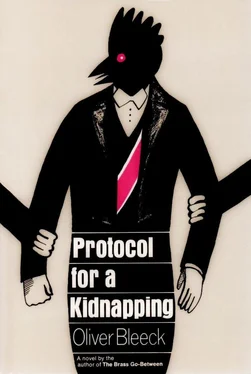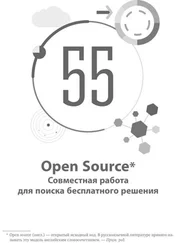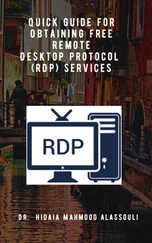“Tell me about Killingsworth.”
“Poor Amfred. He is so clumsy. But nice — like a big, clumsy, friendly dog.”
“I assume that your grandfather doesn’t know anything about either Killingsworth or Stepinac.”
“Or St. Ives?” she said.
“Or St. Ives.”
“Or a number of others,” she said and stretched, thrusting herself against me. “You are very good.” She giggled. “I cannot say in the bed so I will say on the floor. You are very good on the floor, Gospodin St. Ives.”
“Why gospodin?” I said. “Why not comrade?”
“I am not a Communist,” she said, “but, should the necessity arise—” She shrugged prettily. She did everything prettily and so far she was the prettiest liar I’d ever met.
“What happened to your engagement to Stepinac?”
“He became jealous. So I tore it off. Tore is not right, is it?”
“Broke,” I said, suffering a bad case of déjà vu.
“Yes, I broke it off. He wrote me many letters. Passionate ones.” She rolled her eyes naughtily. “One could not believe that a man who says he is of the police could be so passionate. There were so many letters that even Grandfather grew suspicious.”
“Where is your grandfather?” I said. “Or have I asked that before?”
“He is detained,” she said and closed her eyes and drew me down to her again, snuggling up against me.
“Where?” I said, propping myself back up on an elbow.
“Do you think I’m attractive?” she said.
“You know what I think.”
“Would I be attractive in New York? Or Washington?”
“Anywhere.”
She sighed deeply and snuggled some more. “It would have been so nice in New York, I think. Yes, I would prefer New York. I am tired of living in a capital. Or perhaps I shall become a nun after all,” she said.
“Isn’t that the plan?”
She smiled, more to herself than to me. “That is the plan. My engagement to the Church. Such a long engagement. I could not wait.” She pushed me away gently. “But now it doesn’t matter.”
“What doesn’t?” I said.
“Nothing,” she said. “Nothing matters because it’s all over.”
“What?” I could never recall asking so many questing and getting such nonsense answers.
“Come,” she said, rising with a smooth grace and reaching for my hand, “let us go see Grandfather. He is waiting.”
“Like this?”
“Come,” she said, tugging me through a door and down a hall. “Grandfather is waiting.” She was smiling now, but sadly, and some tears were rolling down her cheeks. I could only stare at her. “In here,” she said. “He is in here.”
She opened a door and Anton Pernik, Nobel laureate, lay quietly on a bed, his eyes closed, his hands clasped around a rosary. He was dead. She walked over to him, leaned down, and kissed him on the forehead. She turned to me, naked and lovely, and said, “He is dead.”
“So I see. When?”
She looked around the room. All the religious artifacts and pictures that were missing from the sitting room had been hung on the walls of the bedroom. “He found comfort in such symbols,” she said, making a vague gesture.
“When did he die?” I said, feeling more naked than I’d ever felt in my life.
“This morning. Early this morning. In his sleep. I don’t think he minded. I don’t think he really wanted to go to America, but he thought I did. He thought I wanted to become a nun.”
“Do you?”
I stood in the doorway without a stitch on, looking at the lovely nude girl and her dead grandfather and, as if from a distance, I watched my mind function. I wasn’t proud of what it did, but I was glad to see that it could still work. It did it protestingly, sending out signals of distress and disgust, but it kept on working and when it was done, it spewed out the end product. It wasn’t pretty.
“Do I what?” Gordana said.
“Do you really want to go to New York?”
She shook her head. “It is impossible now. I have no money. My grandfather is dead. I cannot go.”
“Do you want to?” I said. “Do you want to go badly?”
“Yes,” she said softly. “Very badly. I’ll do anything to go.
I stared at her, not liking her much just then, but not liking myself at all.
“You may have to,” I said.
When I got back to the Metropol at seven o’clock I wasn’t surprised to find Slobodan Bartak of the Ministry of Interior waiting for me in the lobby and looking as if he might spit acid.
He approached almost at a lope, his short torso thrust forward, his face screwed up into a twisted advertisement of anger and disapproval. I stopped and waited for him. He halted before me, locked his hands behind his back, teetered up on his toes, and when he spoke his voice was a bitter, petulant charge. “I have been waiting for more than an hour.”
“Did we have an appointment?”
“You have heard from the kidnappers.”
“Ah,” I said.
“Well?”
“Let’s make a deal.”
“Deal?”
“A trade, a transaction.”
“What kind of transaction?”
“I’m sure that there’s some old Yugoslav tradition that calls for a drink during negotiations.”
“I know of no such tradition,” Bartak said. “If one drinks, one drinks after negotiations, not during.”
I took his elbow and turned him toward the bar and toward a drink I did not want. “Let’s fly in the face of tradition,” I said.
“Fly?”
“Where did you learn English?”
He stopped. “What is wrong with it?”
“Nothing,” I said. “You speak it very well.”
“I learned it at the government school,” he said, once more moving toward the bar. “I was first in my class.”
We chose a table in the corner and when the waiter came I ordered vodka. I was tired of plum brandy. Bartak ordered Scotch, probably because I was paying. Neither of us commented on the other’s choice which was just as well because it only would have been something nasty.
Bartak tasted his drink and said, “You have heard from the kidnappers.”
“You said that before.”
“It is true.”
I shrugged. “I may have.”
“What do you mean may?”
“They only said they were the kidnappers.”
Bartak wriggled forward in his chair. He was interested now. “What else did they say?”
“They were primarily concerned about the million dollars.”
“Yes?”
“I told them that it was already on deposit for them in a Swiss bank. The State Department made the arrangements, you know.”
“When do they want to make the exchange?” Bartak said.
“It’s as I said. They only claimed to be the kidnappers.”
“What do you mean?”
“That they could have been anybody. My picture was all over the front page, the story was in all the papers. The call could have been a hoax.”
Bartak pounced on that. “So it was a call?”
“Yes.”
“But not to your phone in the hotel.”
I wagged my head at him sorrowfully. “Now you’ve done it, Mr. Bartak. You’ve gone and tapped my telephone.”
He looked as if he might try bluster at first, but changed his mind in favor of guile. His kind came equipped with a sly look. “Only as a precautionary measure.”
“Of course,” I said. “I understand your concern. But I’m still not sure that the call was from the kidnappers.” It was only the forty-third lie that I’d told in the past few days and I wondered how long it would be before I no longer realized that I was lying.
“Why aren’t you sure?” Bartak asked.
“Because I didn’t talk to Ambassador Killingsworth. Unless I talk to him, there’s no deal. No transaction. No exchange.”
Читать дальше












